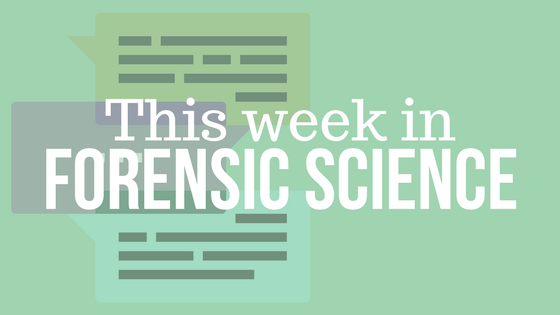No one has hours to scour the papers to keep up with the latest news, so we’ve curated the top news stories in the field of Forensic Science for this week. Here’s what you need to know to get out the door!
MU Forensic Science Lab Nears Completion (The Herald-Dispatch – 3/11/2018)
- For the first time in more than 20 years, the Marshall University Forensic Science graduate program is housed at one location, which professors believe will allow the nationally known program to expand on its class size, courses and research.
National DNA Databank for Missing Persons is Up and Running After Years of Delay (CBC News – 3/12/2018)
- In 2014, the Canadian federal government committed $8 million to expand the database so coroners, medical examiners and police could centralize their DNA indexes.
Lawmakers Push to End Rape Kit Backlog (FOX 40 – 3/12/2018)
- State Senator Connie Leyva, D-Chino, recently introduced a bill, SB 1449, that says law enforcement should submit evidence to a lab within 20 days and labs should process the rape kits within 140 days.
The legislation also sets aside $2 million to help law enforcement agencies process rape kits.
Sex, Power and Ancient DNA (Nature – 3/13/2018)
Turi King hails David Reich’s thrilling account of mapping humans through time and place.
Exclusive: Royal Burial in Ancient Canaan May Shed New Light on Biblical City (National Geographic – 3/13/2018)
- The extraordinary discovery of a magnificent and untouched 3,600-year-old burial chamber in the ancient Canaanite city-state of Megiddo has stunned archaeologists, not only for the array of wealth found in the tomb, but also for the potential insight it may provide into the royal dynasty that ruled this powerful center before its conquest by Egypt in the early 15th century B.C.
DNA Software in the Courts and the Future (Jurist – 3/13/2018)
- Sophisticated forensic DNA software represents a tremendous breakthrough which, when properly used, can identify criminal activity and be presented in court proceedings with a high degree of confidence in the validity of its findings.
Tim Schellburg: Without Criminal Databases, DNA Machine Can’t Work (Mid-Day.com – 3/14/2018)
Tim Schellberg, An Expert On DNA Analysis Technology, Says The Much-Talked-About Rapid DNA Analysis System Is Not Suited To Indian Conditions
OSAC Releases an Online Lexicon for the Forensic Sciences (Forensic Magazine – 3/15/2018)
- To help facilitate clear communication across the many disciplines, the Organization of Scientific Area Committees for Forensic Science (OSAC) has created a Lexicon of Forensic Science Terminology, which can be accessed from the OSAC website.
Oldest DNA from Africa Offers Clues to Mysterious Ancient Culture (Science – 3/15/2018)
- But now, their ancient DNA—the oldest ever obtained from Africans—shows that these people had no European ancestry. Instead, they were related to both Middle Easterners and sub-Saharan Africans, suggesting that more people were migrating in and out of North Africa than previously believed.
No, Scott Kelley’s Year in Space Didn’t Mutate His DNA (National Geographic – 3/15/2018)
- Scores of stories reporting that Kelly’s DNA is substantially different now are missing some basic facts about how biology works.
WOULD YOU LIKE TO SEE MORE ARTICLES LIKE THIS? SUBSCRIBE TO THE ISHI BLOG BELOW!


